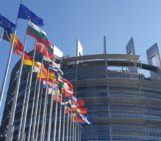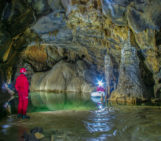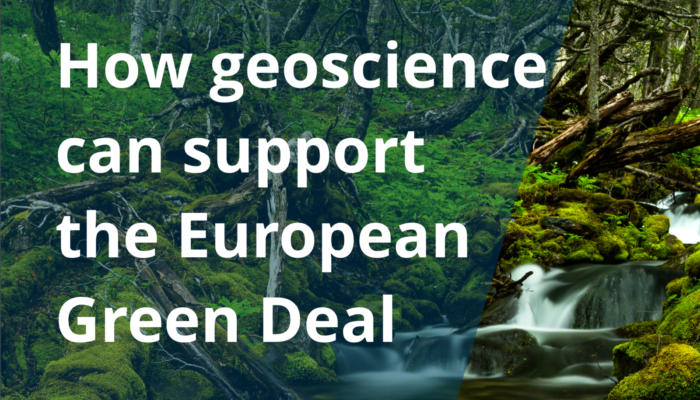
Earlier this year, the EGU hosted the Integrating science into the EU Green Deal event in collaboration with the Intergroup on Climate Change, Biodiversity and Sustainable Development to outline how the geosciences can most effectively support the European Green Deal and ensure its ambitious biodiversity and zero-pollution targets are reached. The event provided policymakers, scientists and industry leaders with the opportunity to come together to discuss key challenges and launched EGU’s informative document How geoscience can support the European Green Deal. This document focuses on two of the European Green Deal’s key policy areas, biodiversity and pollution, and highlights how the geoscience community can support can support them. This blog post will highlight some of the key points that are detailed in the document.
The European Green Deal is a roadmap for turning climate and environmental challenges into opportunities to make the EU’s economy sustainable. The Green Deal sets ambitious targets, including reaching climate neutrality in Europe by 2050; addressing the drivers of biodiversity loss in Europe; restoring degraded ecosystems; and adopting a zero-pollution action plan for air, water and soils. Achieving these bold targets is likely to require scientific expertise from many different geoscience areas, including atmospheric, cryospheric, hydrological, oceanic and soil system sciences.
Biodiversity
Biodiversity encompasses the variety of living organisms on Earth, including their habitats and their interactions. Biodiversity supports our food system, increases community resilience, and underpins more than half of global GDP1. Yet despite biodiversity’s importance, preserving and restoring it remains a complicated task due to the numerous natural and human factors that influence and affect species richness.
Increasing protected areas
The EU Biodiversity Strategy for 2030 is closely associated with the European Green Deal, aiming to increase the EU-wide network of protected areas to 30% for both land and sea, with 10% of each being strictly protected. In addition to providing advice about which areas of land and sea should be protected, scientists can define the range of benefits that particular ecosystems provide, including the carbon storage capacity of different ecosystems. Once individual Member States have designated areas to be protected, scientists can also help highlight steps that can be taken to ensure their conservation and assist with comprehensive ecosystem monitoring to confirm that progress towards their stated goals is being made.
Forests
The EU Forest Strategy, which will be adopted in 2021, will outline a plan to plant at least 3 billion trees in the EU by 2030 and set guidelines for biodiversity-friendly reforestation as part of the European Green Deal. Geoscientists can provide information about the ecosystem services that specific forest types provide as well as threats that each is likely to face depending on factors such as the forest’s location, age, and health. Scientists should play a particularly important role in defining, mapping, and monitoring all the EU’s remaining primary and old-growth forests.
Soils
A large proportion of terrestrial biodiversity is hidden underground. Soil biodiversity enhances the entry and storage of water, raises resistance to soil erosion, and improves nutrient cycling and retention, and is therefore essential for maintaining healthy soils and the ecosystems they support5. Soil system scientists can provide information about soil biodiversity and propose agro-ecological approaches that can optimise carbon sequestration and crop yields and minimise soil degradation caused by contamination, compaction, erosion, and desertification.
Oceans
The EU Biodiversity Strategy for 2030 highlights the socioeconomic benefits of healthy marine ecosystems for coastal communities and the EU as a whole. Research from ocean scientists can supplement the technical support that the EU Commission is currently providing to Member States to help highlight unexpected threats to biodiversity such as the North Sea’s increasing turbidity, which appears to already be impacting this ecosystem’s primary production.
Freshwater systems
To restore freshwater ecosystems and accomplish the objectives outlined in the EU Water Framework Directive, the EU Biodiversity Strategy for 2030 also sets a target of restoring at least 25,000 km of rivers, floodplains and wetlands by 2030. Hydrological scientists can directly support these goals by providing information regarding the sustainable management of water resources, assisting with river-basin management, and monitoring freshwater ecosystems.
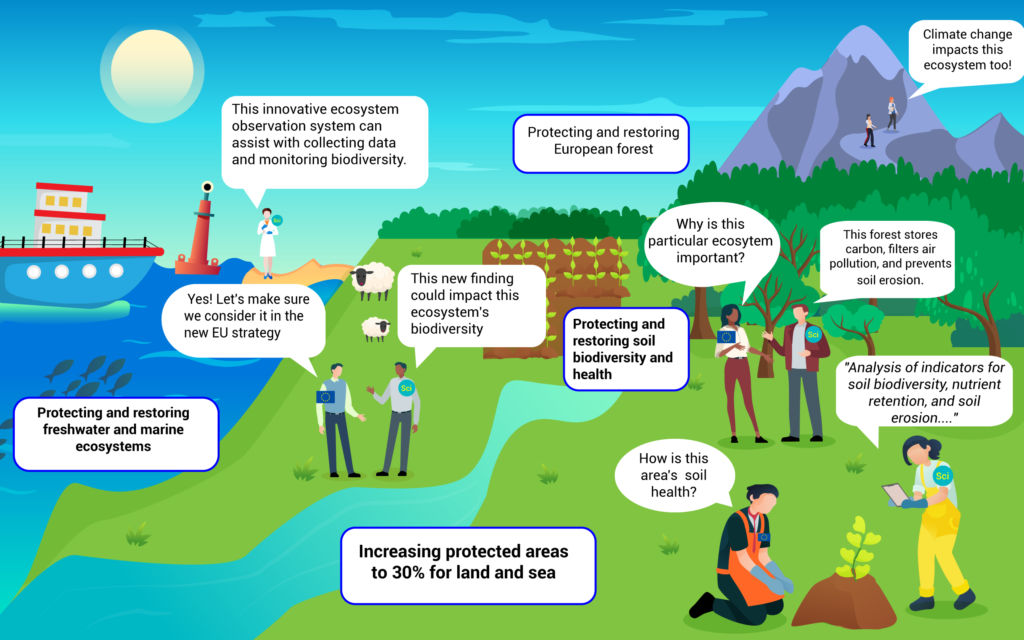
How geoscience can support the EU’s biodiversity targets: a conversation between scientists and policymakers. See Appendix 1 for a conceptual mind map.
Zero pollution ambition for air, water, and soil
The Green Deal’s Zero Pollution Action Plan for Air, Water and Soil, to be adopted in 2021, will address the serious problem of pollution, which can be hazardous to wildlife, human health, and the environment. The Zero Pollution Action Plan aims to both prevent the generation of pollution and to implement measures to remedy it.
Air
It is well established that air pollution harms human health and the environment and affects climate by scattering or absorbing sunlight and impacting cloud formation. Atmospheric scientists can provide expertise to define more ambitious air quality standards that will bring Europe closer to the air-quality guidelines established by the World Health Organisation. Experts can also provide information about key issues such as emissions of primary pollution, formation and transport of secondary pollutants, and the effects of individual pollutants such as black carbon.
Freshwater systems
The presence of pollutants in European waters not only threatens freshwater ecosystem biodiversity but also raises concerns for public health. In 2019, a Fitness Check of the EU’s current Water Framework Directive found that although the directive is flexible enough to accommodate emerging challenges such as climate change and micro-plastics, legislation regarding chemical pollution requires improvement. EGU experts in hydrological and biogeosciences can provide in-depth insights on particular sources of aquatic pollution, such as organic or nutrient pollution from farming, wastewater treatment facilities, or fertilised lands in urban areas.
Ocean and coastal waters
Marine pollution is difficult to manage due to its wide variety of direct and diffuse sources and its dispersal via ocean currents. A 2020 report on the first implementation cycle of the Marine Strategy Framework Directive outlined the need for more action to combat plastic litter, excess nutrients, and underwater noise. Ocean scientists can help define new guidelines, suggest improved monitoring programmes, and help policymakers consider the cumulative effects of the many pollution sources and human pressures that are degrading Europe’s marine ecosystems.
Soil
Soil contamination impacts soil, ecosystem, and human health and continues to be a concern throughout Europe as evidenced by the approximately 2.5 million sites where potentially polluting activities have occurred. Soil system scientists can bolster the EU’s upcoming strategies by improving methods to reduce contamination and helping to implement innovative monitoring and remediation techniques. In particular, soil system research can help farmers reduce nutrient leakage as well as trace sources of contamination whose presence even in low concentrations can adversely affect microorganisms crucial for maintaining soil health.
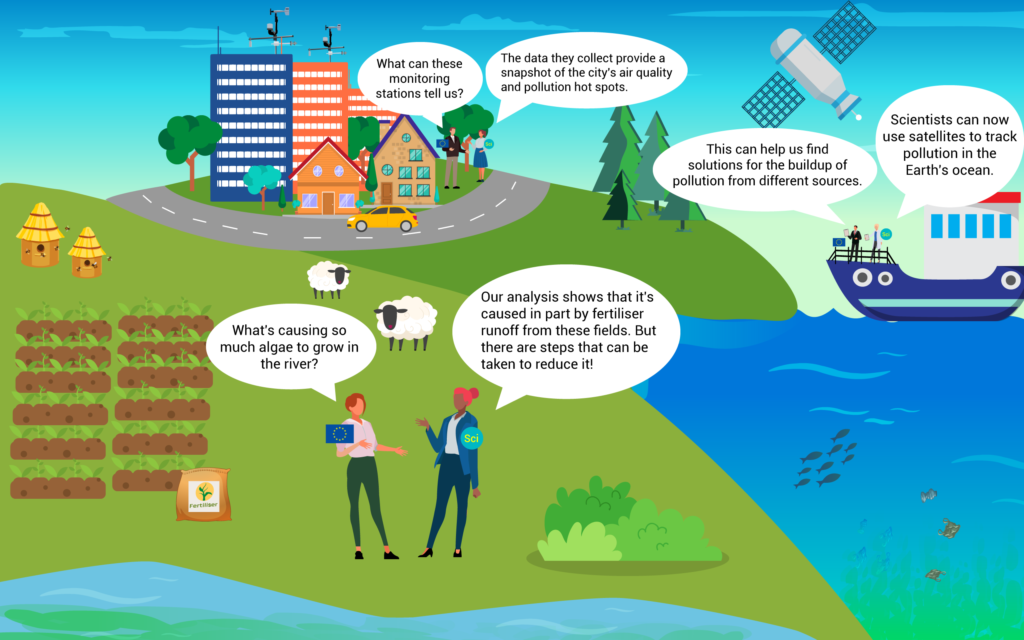
How geoscience can assist in the EU’s zero pollution targets: a conversation between scientists and policymakers. See Appendix 2 for a conceptual mind map.
As Europe’s largest geoscience society, the EGU is uniquely positioned to facilitate the transfer of knowledge from research into practice and to connect policymakers to the most relevant geoscience experts. For more information about how EGU members can get involved with the Green Deal, please contact policy@egu.eu. You can find the full ‘How the geosciences can support the European Green Deal’ document here, watch the recorded ‘Integrating science into the European Green Deal’ event here, and read the summary here.

